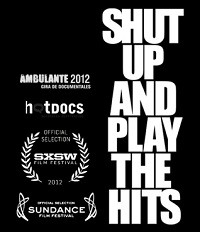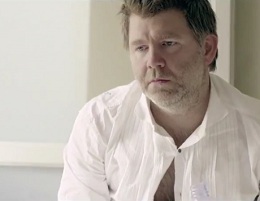 Shut Up and Play the Hits opens with a wistful, contemplative James Murphy looking out a car window at New York City as he’s driven away from sold-out Madison Square Garden, where his band, LCD Soundsystem, just finished playing their highly anticipated final show. It then jumps to the next morning as a very sleepy (hungover) Murphy tries to come to grips with his new life as a 41-year old retiree.
Shut Up and Play the Hits opens with a wistful, contemplative James Murphy looking out a car window at New York City as he’s driven away from sold-out Madison Square Garden, where his band, LCD Soundsystem, just finished playing their highly anticipated final show. It then jumps to the next morning as a very sleepy (hungover) Murphy tries to come to grips with his new life as a 41-year old retiree.
For those familiar with Murphy and LCD, this is a unique and personal peek behind the curtain of one of the most innovative, exciting musical acts of the last decade, yet for everybody else, the majority, it’s probably going to come off as little better than a well-shot concert video.
The film documents the band’s final show, and is clearly meant to be for an exclusive audience already familiar with the band and the events of the documentary. Shut Up and Play the Hits jumps back and forth between footage of this last show, snippets of Murphy’s life the day after, and an interview between the band leader and writer Chuck Klosterman one week prior. During the interview and the movie it frames, the band’s front-man reflects on his decision to end LCD, and vacillates back and forth between what appear to be moments of severe melancholy and even more profound relief: each battling the other for supremacy in the man’s soul.
Unfortunately for the film, one emotion never really wins out, leaving the thematic pulse of the picture weak and difficult to locate.
 Shut Up and Play the Hits has two directors (Will Lovelace and Dylan Southern), a duality that plays out during the film as the audience watches scenes cut back and forth between the mundane banality of James Murphy’s life after the final concert, and those blissfully ebullient scenes from inside Madison Square Garden the prior evening. At times, the film seems to want the audience to feel relieved for Murphy: happy that the hectic headache of his rock star lifestyle is finally in the man’s past. Yet what of that past?
Shut Up and Play the Hits has two directors (Will Lovelace and Dylan Southern), a duality that plays out during the film as the audience watches scenes cut back and forth between the mundane banality of James Murphy’s life after the final concert, and those blissfully ebullient scenes from inside Madison Square Garden the prior evening. At times, the film seems to want the audience to feel relieved for Murphy: happy that the hectic headache of his rock star lifestyle is finally in the man’s past. Yet what of that past?
In a very pretentious move, Shut Up and Play the Hits doesn’t offer any explanation or context for the people and events of the film. James has conversations with people who aren’t introduced, the final concert has guests that are never referenced by name, and the film’s audience is given a very powerful, meaningful experience with nothing to gauge it against. And while it would (somewhat tragically) be nice to assume that the directors simply got caught up in their project, and forgot that they needed to tell a story everybody could understand, it’s more likely that they made a film exclusively for the band’s fans.
 The fact that the film was released last week on a one-night-only basis seems to confirm the latter assumption, and that’s too bad. Art, when it is at its best, functions as a means to bring people together through a neutral, creative medium. Though a piece of art might not please or satisfy everybody, it should at least be accessible to those who might benefit from that experience. Shut Up and Play the Hits suffers from a snobbish assumption that everybody going into the picture understands how important LCD Soundsystem is, and while this might be fun for the band’s fans (of whom this author counts himself among the number), for a casual film-goer, it’s a catastrophic pretension. Why is LCD so important to so many people? Why was Murphy’s decision to end the band at the peak of its popularity such a profound move within the music industry? Shut Up and Play the Hits seems to think that these questions are very important, hence their film, yet it never makes any effort to connect its audience with the answers, ruining an opportunity to share the joy LCD fans experience with the rest of the world.
The fact that the film was released last week on a one-night-only basis seems to confirm the latter assumption, and that’s too bad. Art, when it is at its best, functions as a means to bring people together through a neutral, creative medium. Though a piece of art might not please or satisfy everybody, it should at least be accessible to those who might benefit from that experience. Shut Up and Play the Hits suffers from a snobbish assumption that everybody going into the picture understands how important LCD Soundsystem is, and while this might be fun for the band’s fans (of whom this author counts himself among the number), for a casual film-goer, it’s a catastrophic pretension. Why is LCD so important to so many people? Why was Murphy’s decision to end the band at the peak of its popularity such a profound move within the music industry? Shut Up and Play the Hits seems to think that these questions are very important, hence their film, yet it never makes any effort to connect its audience with the answers, ruining an opportunity to share the joy LCD fans experience with the rest of the world.
Yes, the film is wonderfully shot, with something like a dozen songs from the final show to give its viewers a very intimate, exclusive look at a truly amazing performance, yet if not already a fan of the band’s music, or possessed of a deeper understanding of Murphy’s impact on the indie rock and dance music scenes, it all feels somewhat hollow. Worse, there’s never any time given over to Murphy’s LCD band mates to explain what the journey has meant for them: a curious omission considering all the time given over to random shots of photos taken over the years of Murphy with bandmates Nancy Whang, Pat Mahoney, and the others.
 Even more strange is the lack of any inclusion of a fan’s perspective, at any level, for with the exception of Chuck Klosterman, who clearly has a fully-fleshed out concept of LCD, there is nothing from musical contemporaries or ordinary people to give context to the final concert’s impact; to have had someone other than Klosterman and Murphy speak about the band’s influence and meaning would have given the film a better framework for the unfortunately uninitiated. Instead, the unfocused juxtaposition of James Murphy the unburdened everyman versus James Murphy the remorseful rock god crash up against one another so that the audience isn’t sure what it is supposed to feel.
Even more strange is the lack of any inclusion of a fan’s perspective, at any level, for with the exception of Chuck Klosterman, who clearly has a fully-fleshed out concept of LCD, there is nothing from musical contemporaries or ordinary people to give context to the final concert’s impact; to have had someone other than Klosterman and Murphy speak about the band’s influence and meaning would have given the film a better framework for the unfortunately uninitiated. Instead, the unfocused juxtaposition of James Murphy the unburdened everyman versus James Murphy the remorseful rock god crash up against one another so that the audience isn’t sure what it is supposed to feel.
A very entertaining movie with wonderful segments showcasing maybe the best band in the world at the time of their final gig, Shut Up and Play the Hits fails to connect its subject matter to a larger narrative about what LCD Soundsystem means not only for itself, amongst fans and members, but within the musical community at large. The film implies that the band’s impact was significant, hence the MSG show, yet for those not already in on that wonderful secret, the implication isn’t quite as convincing.





Comments on this entry are closed.